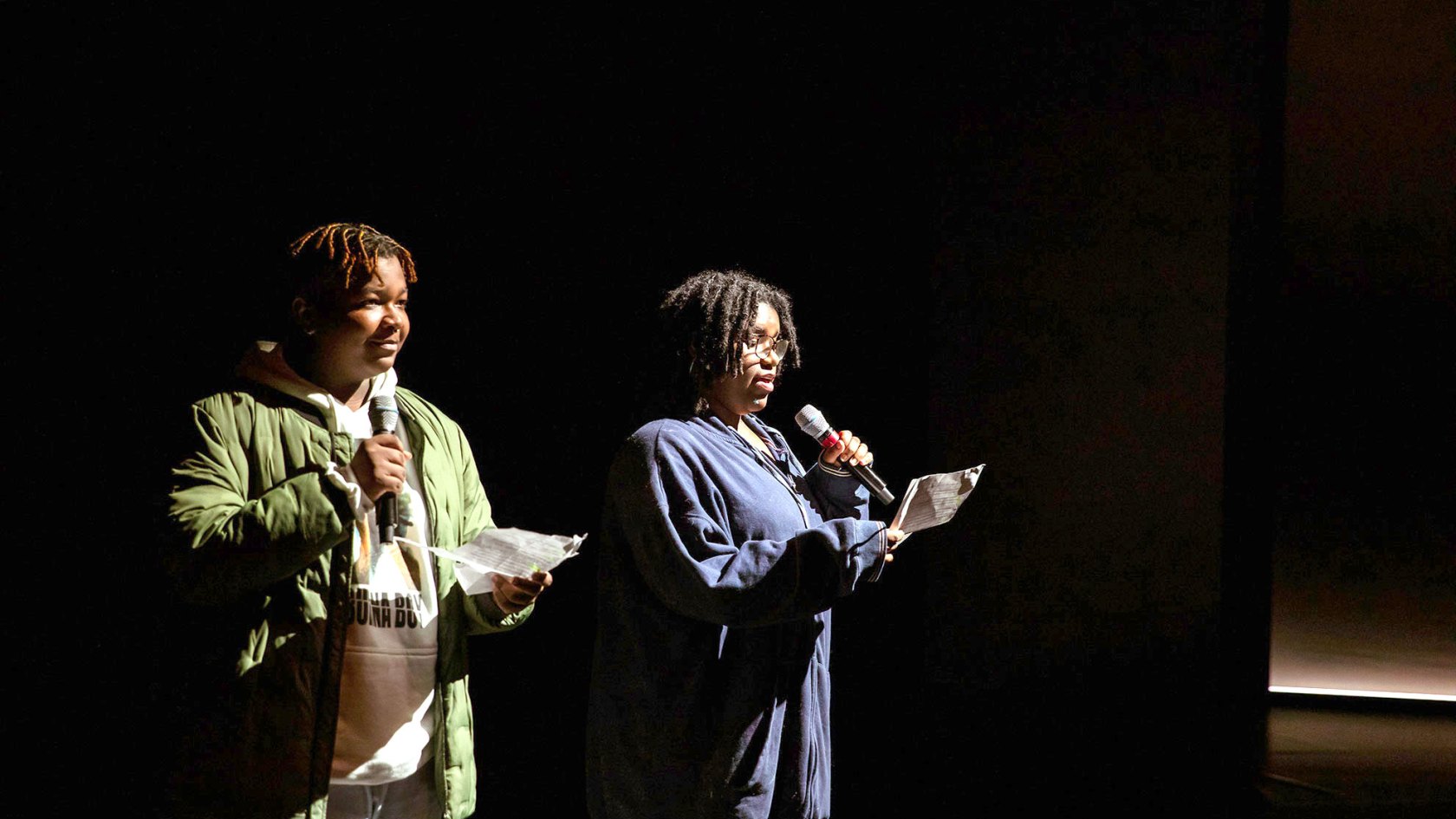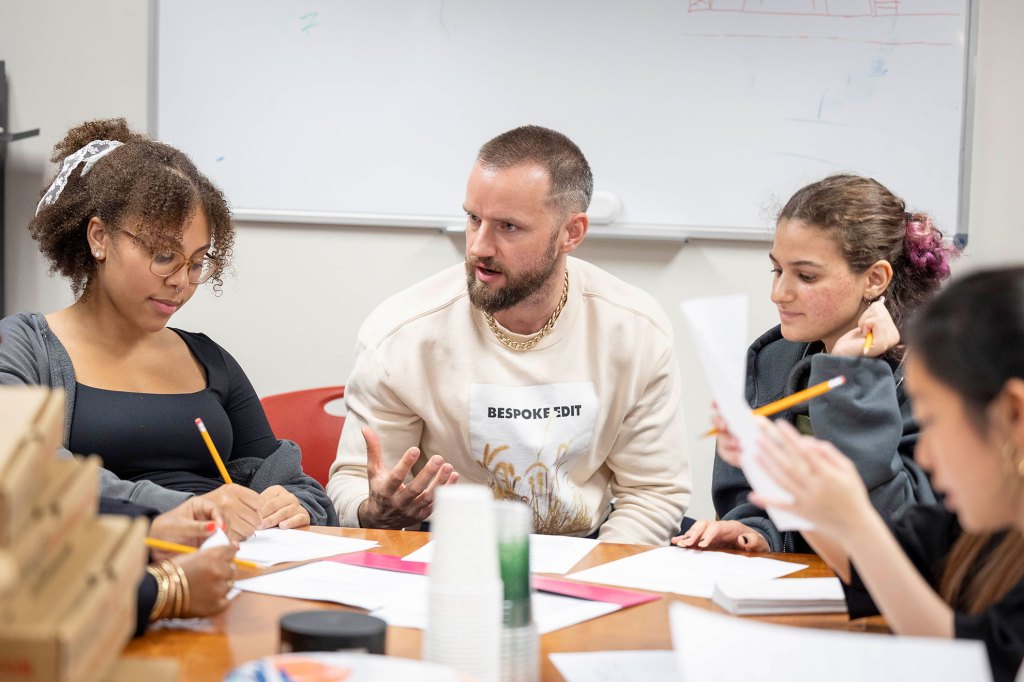The very model of a modern major initiative

On the nights they attend A.R.T. performances, Lavine Learning Lab students welcome audiences to the Loeb Drama Center.
Photo by Lauren Miller
A.R.T. and Lavine Learning Lab aim to create a space for intergenerational dialogue, deepen student engagement with theater
Supporting student engagement in live theater as it fosters lasting relationships between the two is the idea behind the American Repertory Theater’s Lavine Learning Lab. The new student initiative will, among other exercises, bring participating public high school students to an evening performance of every show in the company’s season.
Rooted in A.R.T.’s core values of inquiry and collaboration, the Lavine Learning Lab uses A.R.T. productions as the foundation for student workshops that bridge the arts, humanities, and social and emotional learning, fostering lasting relationships between the theater and its young audience.
“The theater is where we develop our muscles for inquiry, empathy, and debate,” said Artistic Director Diane Paulus ’88. “The Lavine Learning Lab will be a gymnasium where high school students will come to exercise their humanity so they can become the most impactful citizens and participants in our society.”
“The lab’s students will diversify A.R.T.’s audience in multiple dimensions, turning our theater into a space for intergenerational dialogue among people with different lived experiences and perspectives.”
Dayron J. Miles, A.R.T. associate artistic director
For each production, students participate in an introductory in-school workshop centered around the production’s “Essential Questions”; a pre-show workshop at A.R.T., held alongside a second Learning Lab school, exploring one of the production’s themes or elements, followed by dinner and a performance; and a post-show, in-school student-led workshop for students to unpack their own perspectives and those of others.
In addition, two educators from each participating school join a Professional Learning Community in which A.R.T. facilitates ongoing collaborative learning and provides professional development.
An important aspect of the program is Learning Lab students will attend evening performances of every show in A.R.T.’s season — instead of morning matinees traditionally designated for school groups. Students will sit in groups of two to four, alongside the general evening audience.

Students at a pre-show workshop with “Romeo and Juliet” actor Alex Ross.
Credit: A Priori Photography
“When we attend a performance, we aren’t impacted only by what we see onstage, but also by our fellow audience members,” said A.R.T. Associate Artistic Director Dayron J. Miles. “The lab’s students will diversify A.R.T.’s audience in multiple dimensions, turning our theater into a space for intergenerational dialogue among people with different lived experiences and perspectives. Empathy is a necessary tool for responsible democratic participation, and that’s what we can cultivate with this model.”
Evening attendance also builds familiarity with theatergoing and sense of belonging at the theater to cultivate a culture of lifelong theatergoing. To increase accessibility by removing common barriers, A.R.T. provides transportation between the schools and the theater and a pre-show dinner onsite.
The Lavine Learning Lab is supported by a $5 million gift from the Crimson Lion / Lavine Family Foundation, which was founded by Bain Capital Chair Jonathan Lavine, M.B.A. ’92, and Jeannie Lavine ’88, M.B.A. ’92, to support nonprofit organizations focused on leveling the playing field for individuals and families.
“We’ve been struck by A.R.T.’s commitment to expanding access to theater,” said Jeannie and Jonathan Lavine in a statement. “We are delighted to play a part in engaging Boston’s students and teachers in the essential questions sparked by A.R.T.’s world-class programming and in supporting A.R.T., whose work inspires people all throughout our city and this country.”
The Learning Lab exemplifies the type of community-centered, accessible programming A.R.T. will offer from its new home, the David E. and Stacey L. Goel Center for Creativity & Performance. Currently under construction at 175 N. Harvard St. in the Allston neighborhood of Boston, the center is expected to be completed in the fall of 2026.
A.R.T. facilitated a pilot with six public high schools during the 2023-2024 school year to develop the current model.
“I feel like a lot of my analytical skills have been reinforced and retaught in the Learning Lab, but I’ve also taken the vulnerability that I feel when I’m in the lab and applied it to other parts of my life,” said Malden High School student and pilot and Learning Lab participant Addison McWayne. “This experience has provided me with opportunities to speak up for myself and to share my opinion, which has made me a stronger and more confident person.”
“The lab is one of the ways that A.R.T. shares the resources of Harvard University with our community, but the A.R.T. community gains so much, too,” said Kelvin Dinkins Jr., executive director of the A.R.T. “The students bring their anticipation and excitement, which translates into a galvanizing energy on the sidewalk, in our lobbies, and in the theater itself that enhances the experience for everyone. Thanks to this incredible support from the Crimson Lion / Lavine Family Foundation, A.R.T. is positioned to bring our mission into public high schools across Boston for years to come.”
“When the Lavine Learning Lab works in Boston, we hope it will be a model for other cities, because A.R.T. has led the way in so many areas, and A.R.T. can help lead the way in providing this kind of access and inspiration to students all over the country,” said the Lavines.




